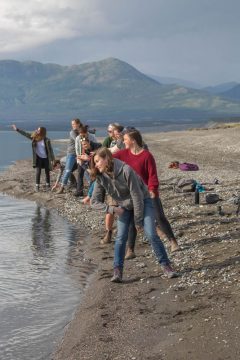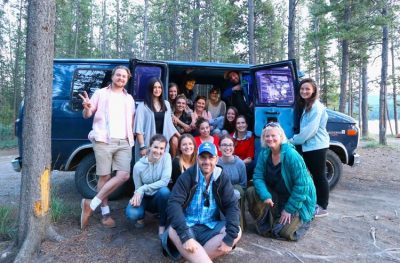By Lauren Sproule, TLS staff writer
Liam Harrap recalls gathering around the fire with his classmates, huddling close to the flames as the words of an elder named Harold drew them into the narrative of the North.
He remembers sitting next to a cluster of old wooden buildings south of Whitehorse, Yukon as they watched the flames dance in the pit.
Harold would go on to tell them the buildings they sat beside were the shells of a residential school and the fire they watched so intently was built with wood taken from its walls.
“It was very symbolic,” says Harrap. “That stood out the most to me.”
This was one of the many experiences had by Harrap and his 14 classmates enrolled in Stories North, a summer course created by Kanina Holmes, an associate professor in Carleton’s School of Journalism and Communication.
Taking place over the course of a month, Stories North began in mid-June of 2017 and included a combination of lessons both inside and outside of the classroom, says Holmes.
She says the idea came to her in 2015 after she finished reading the final report from the Truth and Reconciliation Commission.
“I thought, ‘this is an incredible document,’” Holmes says. “I was really interested in the fact that there was one specific section that dealt with the media and reconciliation.”
Holmes says she asked herself what she could do and thus the concept for Stories North was born.
Two years of rigorous research and brainstorming, as well as a visit to the Yukon in 2016, helped Holmes craft a curriculum for the course, which was funded in part by a $15,000 grant she won from a Carleton University Teaching Achievement Award and a FutureFunder campaign that raised an additional $12,570.
She says Carleton’s Discovery Centre and the Educational Development Centre also contributed funding to support the course development and structure.
Students were required to produce a variety of journalistic works including podcasts, written reports, photo essays, short documentaries, and multimedia packages, of which Holmes says they had the freedom to choose. A selection of the final products can be found on the course website.
Holmes, who once worked for both CBC radio and television in Whitehorse, says she was eager to share the “magic” of the North with her students.
“To me, as an educator, the opportunity to take 15 or 20 students into a context where they could deeply learn about it was a step in the right direction,” she says.
Holmes says the course was, in part, a response to the Truth and Reconciliation Commission’s report, as well as an attempt to solve an issue she feels has been plaguing the education system for a number of years.
She says she has noticed less engagement with course material on the part of both the students and instructors due to the intense over-stimulation of the media in our everyday lives.
Her solution?
“We need to shake things up in terms of the way we teach,” she says.
And shake things up she did, says Harrap, adding that it was a very full month.
“It’s probably one of the best courses I’ve done here at Carleton,” says Harrap. “[Holmes] packed a lot in.”
Harrap described going on course “walk ‘n’ talks,” a kind of mobile lecture, during which the students were led through the surrounding areas by both foot and water to discuss plant biology and the history of the land, among other subjects.
One class was led by a chef forager, says Harrap, who showed the students what plants along the trails were safe to eat.
“It opened my eyes up to things for my own research that I wouldn’t have considered and different types of people to talk to that wouldn’t have crossed my mind,” he says.
Some of the more challenging course material, Harrap says, came with learning at the feet of residential school survivors.
“It’s so brave. I can’t imagine doing anything like that … It really presses against you,” Harrap says of the stories shared with his class from the residential school survivors. He adds that the overall message received was, “Don’t let this go to waste.”
To learn more about how you can incorporate experiential learning in your courses, please visit Carleton’s experiential education site or contact the EDC at edc@carleton.ca.

